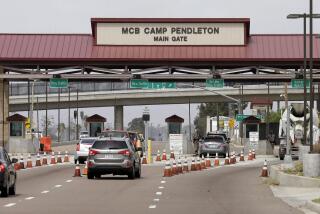Leaders Change, Focus Doesn’t
- Share via
CAMP PENDLETON — Generals come and generals go at this Marine base, but rarely has a change of command carried as much history of the U.S. war in Iraq as Monday’s ceremony.
Lt. Gen. John F. Sattler is leaving as commanding general of the 1st Marine Expeditionary Force and the Marine Forces Central Command to take a high-level job at the Pentagon.
He led Marines during the violent battle in Fallouja in November 2004 -- the bloodiest street fighting the Marines have encountered since Vietnam -- and afterward said, “We have broken the back of the insurgency.”
Sattler is being succeeded by Lt. Gen. James N. Mattis, who led Marines into Afghanistan in 2001 and, as commanding general of the 1st Marine Division, led troops during the assault on Baghdad in 2003 and on Fallouja in April 2004.
Mattis, who left Camp Pendleton two years ago for a job at Marine headquarters at Quantico, Va., will now be the central figure in deciding two high-profile cases of alleged brutality by Marines against Iraqi civilians.
Sattler, a Naval Academy graduate and a 34-year veteran of the Marine Corps, is set to become director of strategic plans and policies on the Pentagon’s joint staff -- a key position in guiding the Marine Corps through the final stages of the Iraq war and the years beyond.
Sattler said Monday that his comment in the aftermath of Fallouja may have been overly optimistic but that he remains upbeat about U.S. progress in fighting the insurgents and training Iraqi forces.
“Evil is in a hell of a lot of trouble” in Iraq, Sattler told 500 Marines and several dozen guests at a ceremony filled with music and flags on a sprawling athletic field. Still, he declined to predict when the U.S. would be able to leave Iraq.
He said the Marines have made progress in another war-torn Sunni Triangle city. “We’re moving Ramadi in the right direction,” Sattler told reporters.
Mattis, as the new commanding general of Marine Forces Central Command, will decide whether Marines should face criminal charges in connection with the killing of 24 Iraqi civilians in Haditha in November.
If charges are filed and a preliminary hearing is held, he would then decide whether the case should go to a court martial. If any Marine or sailor is convicted by a jury or judge, Mattis would then decide whether the conviction should stand.
In a second abuse case, involving the killing of an Iraqi in Hamandiya, charges have been brought against eight enlisted Marines, and preliminary hearings are set to begin late next month.
The 1st Marine Expeditionary Force command is a kind of umbrella organization that includes 50,000 Marines and sailors from infantry, logistics and aviation units.
Among Marine officers, it is a particularly prized assignment: The last two Marine Corps commandants, Michael Hagee and the recently named James Conway, had served as its commanding general.
The 1st Marine Expeditionary Force, Mattis told the crowd, “stands between our country and some very bad people out there.”
More to Read
Sign up for Essential California
The most important California stories and recommendations in your inbox every morning.
You may occasionally receive promotional content from the Los Angeles Times.













